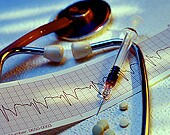 A service of the U.S. National Library of Medicine
A service of the U.S. National Library of Medicine  National Institutes of Health
National Institutes of Health

Many Heart Attacks May Go Unrecognized in Seniors

TUESDAY, Sept. 4 (HealthDay News) -- Far more older people than thought may suffer heart attacks that are never diagnosed, a new study suggests.
These so-called "silent heart attacks" can increase the risk of dying as much as any confirmed heart attack does, the researchers added.
To reach their conclusion, the study authors used sophisticated MRI scans to spot heart trouble among more than 900 older Icelanders between the ages of 67 and 93.
"MRI scanners are really a spectacular tool for finding heart disease," explained lead researcher Dr. Andrew Arai, chief of the cardiovascular and pulmonary branch at the U.S. National Heart, Lung, and Blood Institute.
However, people shouldn't be running out to get scanned, he stressed: "I wouldn't recommend that. Most guidelines don't recommend having these expensive tests unless you are having symptoms."
Right now, it isn't clear when such scans are called for and who would benefit from them, Arai noted, although this latest finding is a first step toward determining that.
The report was published in the Sept. 5 issue of the Journal of the American Medical Association.
Among the more than 900 Icelanders studied, 91 had heart attacks that had been diagnosed, while 157 had heart attacks that had not been recognized before, the researchers found. Cardiac MRI detected more cases of unrecognized heart attack in people with diabetes (21 percent) than in those without diabetes (14 percent), the researchers added.
Over more than six years of follow-up, 33 percent of those who had recognized heart attacks died, as did 28 percent of those with unrecognized heart attacks, which was significantly more than the 17 percent who died among those who had never had a heart attack, the researchers noted.
Not surprisingly, significantly more people who had a recognized heart attack were taking beta blockers to lower blood pressure and statins to lower cholesterol than people who had an unrecognized heart attack.
In fact, about half of those with an unrecognized heart attack were taking aspirin, but less than half were taking beta blockers or statins. This may well have added to their risk of having a heart attack, the researchers suggested.
The greater number of unrecognized heart attacks may be due to several factors, including diabetes, which raises the risk of a heart attack, milder symptoms and a less severe attack, the study authors noted.
Although the study was done in Iceland, Arai said he believes the results would be similar in the United States.
Commenting on the study, Dr. Gregg Fonarow, a spokesman with the American Heart Association and a professor of cardiology at the University of California, Los Angeles, said: "Prior studies have demonstrated that a portion of myocardial infarctions [heart attacks] are not detected clinically, or are so-called 'silent myocardial infarctions.'"
Cardiac MRI is a very sensitive approach for detecting heart attacks, he added.
"This study found a higher prevalence of previously unrecognized heart attacks than described in prior studies," Fonarow said. "Silent heart attacks have a similar adverse long-term prognosis as clinically recognized heart attacks."
Fonarow, however, doesn't think cardiac imagining is useful yet as a screening tool to find people at risk for a heart attack or to diagnose an unrecognized heart attack.
"At this point in time, there is not sufficient evidence on which to recommend cardiac imaging as a screening test. Further studies are necessary," he said.
SOURCES: Andrew Arai, M.D., chief, cardiovascular and pulmonary branch, U.S. National Heart, Lung, and Blood Institute, Bethesda, Md.; Gregg Fonarow, M.D., spokesman, American Heart Association, and professor, cardiology, University of California, Los Angeles; Sept. 5, 2012, Journal of the American Medical Association
- More Health News on:
- Heart Attack
- Seniors' Health